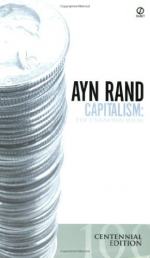
|
| Name: _________________________ | Period: ___________________ |
This test consists of 15 multiple choice questions and 5 short answer questions.
Multiple Choice Questions
1. What does the author believe is the basic tool of business?
(a) Land.
(b) Wages.
(c) Values.
(d) Labor.
2. The existence of money promotes the division of what?
(a) Specialties.
(b) Economic classes.
(c) Labor.
(d) Social classes.
3. Who does Algeria fight for independence?
(a) Germany.
(b) Spain.
(c) Britain.
(d) France.
4. The author believes that businessmen take the blame for what?
(a) Capitalism.
(b) Recessions.
(c) Government actions.
(d) Depressions.
5. What is the goal of the creation of the Federal Reserve System?
(a) To ease temporary reserve shortages.
(b) To limit the amount of currency in circulation.
(c) To create a national savings account.
(d) To create a spending account for the military.
6. According to classical economics, what is the basis of competition?
(a) Producing and selling in a down market.
(b) Producing and selling for profit.
(c) Producing and selling in a regulated system.
(d) Producing and selling as much as possible.
7. Who is J.J. Hill?
(a) A businessman.
(b) A government regulator.
(c) A government official.
(d) A developer.
8. How is man viewed in tribal European culture?
(a) As subjected to the will of the whole.
(b) As independent of the whole.
(c) As free of the whole.
(d) As part of the whole.
9. What does the author blame for crises and depressions in capitalism?
(a) Allocation of resources.
(b) Bad choices.
(c) Cyclical economies.
(d) Government interference.
10. Patents apply to what?
(a) Inventions.
(b) Land.
(c) Personal information.
(d) Theoretical knowledge.
11. What subject does Stewart Holbrook write about?
(a) Corruption in the railroads.
(b) Government assistance to the railroads.
(c) Failure of the railroads.
(d) Railroad monopolies.
12. What is another word for statism?
(a) Communism.
(b) Concernism.
(c) Collectivism.
(d) Connectivism.
13. What is the first antitrust legislation?
(a) The Trump Act.
(b) The Humphry Act.
(c) The Sherman Act.
(d) The Taft Act.
14. Railroads are built using government money, and what happens to many of them?
(a) They prosper.
(b) They repay the investors.
(c) They abuse their workers.
(d) They go bankrupt.
15. Who is the author of this book?
(a) Ayn Rand.
(b) Annabelle Rand.
(c) Anna Rand.
(d) Alena Rand.
Short Answer Questions
1. What kind of rights, according to the author, is the American system of government based on?
2. According to the author, what kind of governments use weapons against their own people?
3. Who does the author say would earn more money than Einstein?
4. When there is protection of the consumer by the government, it lessens the efforts of the firm to provide protection through ________.
5. How are the railroads subsidized?
|
This section contains 395 words (approx. 2 pages at 300 words per page) |

|




